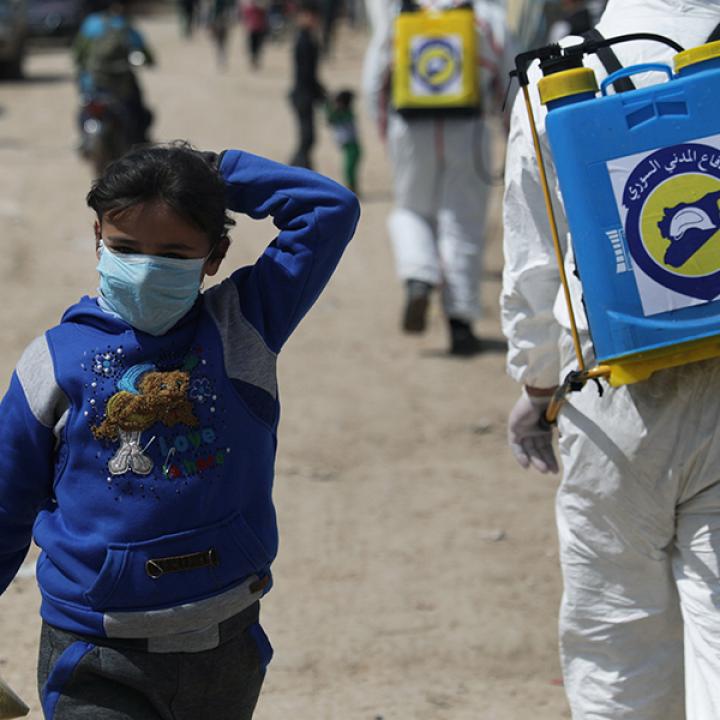

Although the pandemic’s full regional consequences remain murky, some early trends are becoming clear, from caution among certain proxy patrons, to escalation among others, and a looming financial crunch for all.
The Coronavirus public health and economic crisis has not stopped, nor even slowed, the foreign-backed fighting in Libya, or the sporadic ISIS and Iranian-backed militia attacks in Iraq. But at least for the moment, two of the region’s other large proxy wars, broadly defined, are calming down: the fighting in Syria’s Idlib province has abated; and the active fronts in Yemen have narrowed or stalled, with several outside patrons, especially Saudi Arabia, clearly seeking a cease-fire. These snapshots capture some of the mixed or even contradictory regional trends affected by the advent of the Corona crisis.
To be sure, it is still very early in this virus boom and economic bust trajectory, and therefore hugely premature to draw any firm conclusions. Possibly, Corona may contribute to some significant shifts in the region—more likely from its dire secondary economic effects, and their potential political spillover, than from any direct medical issues. Or it may be that the episode will pass, as did the much more severe “Spanish flu” global pandemic of 1918-23, without causing any fundamental shifts in military or international political affairs. Nevertheless, a few tentative new trends are already worth noting.
First, Corona is probably accelerating or reinforcing, rather than initiating, a pattern of relative caution or retrenchment on the part of various key patrons toward their armed regional “proxies.” In Syria, the U.S. had previously drastically drawn down its presence and support for both the opposition and the SDF; while Russia, Turkey, and Iran were moving toward a series of deals, albeit fragile ones, to delimit their spheres of influence short of full-fledged military conflict. In Yemen, likewise, the Saudis were seeking a way out even before Corona hit hard. In Iraq, the pattern of limited, low-level, hit-and-run militia attacks had also become fairly well established, long before the virus spread.
Similarly, on the Lebanese border, both Hezbollah and Israel were already practicing a familiar cycle of occasional provocations and retaliations, yet mutually deterred from escalation. Corona has neither increased nor decreased this interaction to any observable extent. On the Palestinian front, ironically, Corona has actually added a reason for selective security and public health cooperation between Israel and the Palestinian Authority in the West Bank, and even between Israel and Hamas in Gaza.
In most cases, therefore, Corona has arguably just added one more cautionary or distractive element to the mix. Proxy patrons are now understandably preoccupied with their domestic responses to the Corona crisis—and perhaps also more concerned about their medium-term economic capacity to fund more robust military confrontations. Even if they do not fully control their local clients, and even if they keep supporting small-scale harassment operations, they most likely would prefer to avoid another major conflict while they attempt to cope with Corona.
Second, even in the case of any one specific patron, these effects appear uneven. For example, as my colleagues Soner Cagaptay and Deniz Yuksel have pointed out, Turkey has just stepped up its support for its Tripoli-based clients in the ongoing Libyan civil war, where it is less exposed to direct health, economic, or combat risks. At the same time, it has restrained its support for Turkish clients in Idlib, where those risks are considerably greater today.
Third, the glaring exception to this cautionary tale lies with some of the jihadi groups active in the region. ISIS is nobody’s proxy now, but it is clearly taking advantage of the vacuum left by the Corona-fueled retrenchment of others. In both Iraq and Syria, ISIS attacks reached their highest recent level in March. Its young fighters, used to underground living, free of responsibility for any civilian areas, relatively isolated (and possibly more immune) from infection, and ideologically less concerned about it, are propelling this resurgence. Still, if Corona does hit them, their lack of access to medical care may well induce a sudden limit to their activity.
Fourth, the longer-term Corona effects, as noted, may well be more economic than medical. The oil bust and broader downturn might shift patrons’ priorities and resources away from their regional proxies, leading to less endowed but perhaps more fragmented and unpredictable activity. Looking further ahead, however, if Corona’s economic toll sparks even greater operational insecurity and political instability in regional states, then today’s non-state “proxies” may have greater margin for maneuver on their own—including a search for new sponsors, insider or outside the region.
For the time being, then, the Coronavirus will probably lead to a lull in some of the region’s tragically numerous proxy wars, after an initial flurry of jihadi and certain other operations. The medium-term consequences, though, remain unavoidably murky, in both scope and direction. In that respect, the full political, military, and economic implications of Corona are still about as mysterious as the virus itself.
David Pollock is the Bernstein Fellow at The Washington Institute and director of Project Fikra. This article was originally published by the Carnegie Corporation’s Proxy Wars Initiative.
Carnegie Corporation



